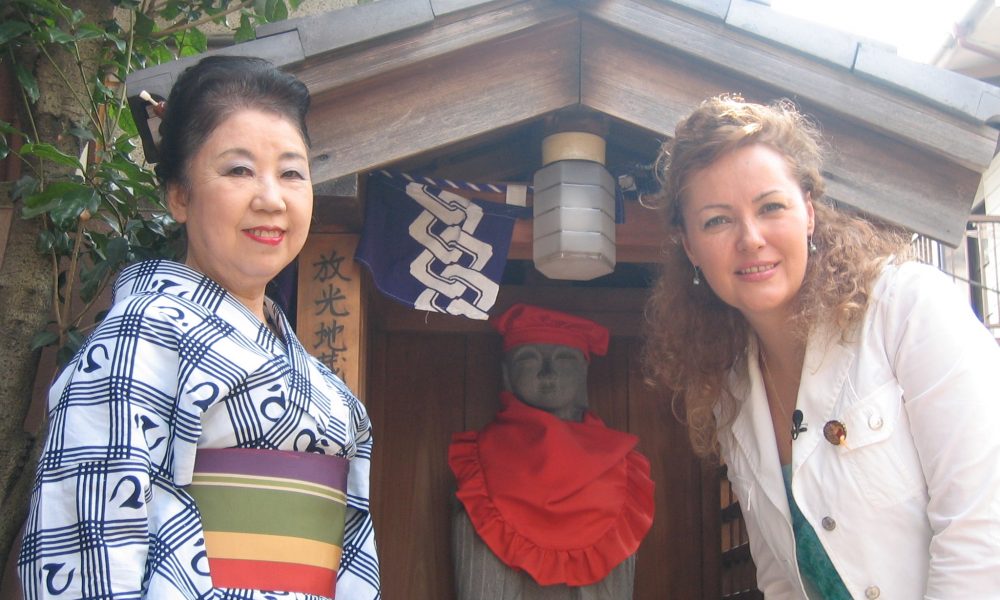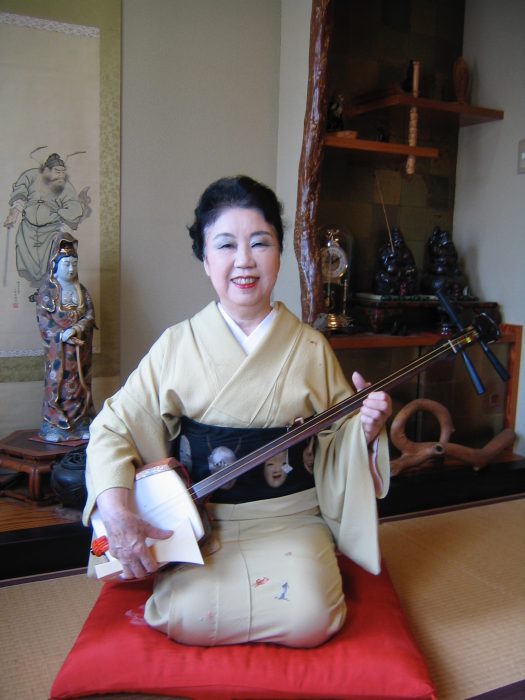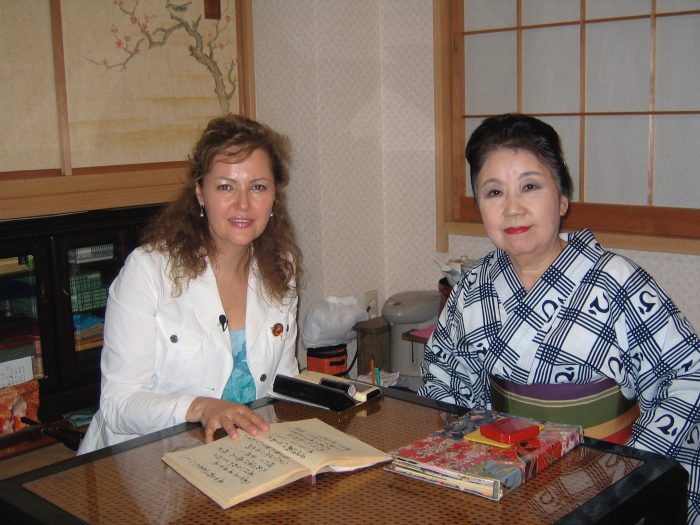
Words to Live by: Shamisen player and singer Suzue Akashi
Interview by Judit Kawaguchi
I have good skin and posture because I grew up in a milk hall. My parents ran a milk hall. They also bottled and delivered milk all over town. At that time, in the 1930s, milk was a luxury, and I was very lucky because I could drink as much as I wanted. At school kids teased me for my white skin. “You drink lots of milk so your skin is so pretty!” Later when I was living in the U.S. in the 1950s, both blacks and whites asked me why I had such white skin with so much straight black hair. Many touched my hair and face.
If it’s short and sweet, then nobody gets bored. People get tired of listening to others so I sing hauta, which are 2- or 3-minute songs, with great punch lines, compiled from the best parts of longer pieces. I also sing zokkyoku which are the popular songs of the 19th and 20th centuries.
I operate like a U.S. university: easy to get in, but hard to graduate from. In the traditional Japanese art world, the teachers are revered and pick their students carefully. I don’t. I never refuse anybody who wants to learn from me. I have a responsibility to give my knowledge to as many students as possible.

After surviving the war, I can never complain. Our whole neighborhood in Tokyo was firebombed. Once the bombs hit their targets, the napalmed cloths from inside them flew all over the place so every 15 or 20 centimeters a small fire was born. It was so pretty. We ran through the firestorm, down to the Tamagawa River. Once we got there, we were stunned, because the riverbank was already full of people. Many stood in the water. We couldn’t squeeze in. This is when the U.S. planes started dropping firebombs right on top of the people in the river. From a river of fire we were in a river of blood. I don’t how why and how my family survived Word War II, but we all did.
War is hunger. We were always so hungry. After the firebombing, I crawled back to the place where our house used to stand. In the rubble I found an iron pot, which I remembered had a little rice in it earlier that day. I opened it but the rice was gone: it all turned into a lump of black charcoal.

The world of the Japanese is very delicate and the Japanese are very sensitive. A tiny mistake can hurt others. The choice of words and their intonation, the tone of voice, the body language, they all matter. Japanese communication is through so many means, so many sources, yet simultaneously. We read all these signs and it creates an image of the person in us. We had better be careful of our own stance and behavior.
War is never personal. I never hated the Americans for what they did to us and I’ve never held grudges against the U.S. either.
Why sleep when being awake is more fun? I took a luxury liner to the USA on board one of the vessels of the American President Line. It took two weeks to San Francisco. There were very few Japanese among lots of wealthy Chinese, Indian and Phillippino men. I never stayed in my room but fooled around on deck. I had dates on all decks and although I had a good room, I ended up staying up on deckchairs, staring up at the sky, with some charming men after me.
Some people see colors but not the whole picture. It was the 1958 and I was working as a secretary at a cotton office in Texas. A colored engineer was injured on one of the machines at the factory and rushed to the hospital. In a while we got a call from the hospital that the doctor refused to treat him. Our president, Mr. Tapp, was furious and drove to the hospital himself. He screamed at the doctor until he finally agreed to help.
Airplanes are a bore. They get you places but not in style. That is all. I never fly because there is not much to see.
I was never serious about men. They were serious about me, but I was only serious about playing around with them. The key is not to go too far because then guys lose interest.
Even dull places have interesting people. Sure, I can find the coolest and hippest people in any place in a day but I never intended to live in the U.S., because it is just not fun there. The U.S. is a dull country; there is nothing to do there. It is so boring! People go to church on Sundays, then eat a big meal, chat and some even go back for the evening service. Maybe big cities like New York are better, but I doubt that they are as exciting as Tokyo. In Tokyo we have so many fun places to go, things to do. I had to come back to Japan.
It’s better to love than be loved. After I came back to Japan, I married a Taiwanese man who supplied noodles to my father’s restaurant. I’d never noticed him before even though he was always stopping by. Once he proposed, I just couldn’t say no. That is just me. He adored me and treated me like a princess but I couldn’t return his feelings. Those were sad times, so I can’t even remember how many years we were together. He had liver cancer and died in my arms.
Forget the past, if it’s sad. Remember it, if it’s happy. Either way, don’t dwell on the past.
It’s never too late to switch careers. I was 40 and making great money as an Avon Zone Manager. I loved my life. One day I bought a record of minyo, or traditional folk songs. As I listened, I could smell the fresh soil and crisp air those songs were born in. I was hooked and started to take shamisen lessons.
Watching TV is nonsense. I either work or practice my songs. I hate sitting around.

Selling is all about complimenting the customer. Find something you like about him or her and praise it. Never lie!
I don’t need to be loved by everyone. I’m always honest and speak the truth, even if it hurts at times. Most Japanese say what the other person wants to hear, but they never say what should be said. This creates lots of problems.
Geishas’ lives are about endurance and effort. I worked as a musician at Matsubaya, at one of the top ryotei (a high-class Japanese restaurant). Guests enjoyed delicious sukiyaki or tempura dinners while listening to music and enjoying the dances of geishas, who were superior artists.
Two parents must have one voice. My second husband was also Taiwanese. We were very happy at first. He had four children from his previous marriage, with two still at home. He was the typical sweet father, letting the kids run wild. I tried to discipline them and asked them to study and behave but he never backed me up. He just stayed silent. A weak father makes a good mother look evil. I had no choice but to divorce him.
If you want to be successful, you need to have a specialty, something about you that nobody else has, a sort of atmosphere.
Learning something for a long time is not enough; continuing it for life is the key. People study an art form but once they feel they are pretty good at it, they quit. Soon they forget everything they had learnt. What a waste!
If I could be half as nice as my mother was, I would be a wonderful woman. My mother was always gentle, always smiling and working. She was the most patient and gentlest person I have ever met. She worked so hard in our milk hall, taking care of the delivery guys and customers. There is no woman like her in the world! She never complained, never said anything negative.
For a lucky few, love happens more than once. My father passed away in 1965, just one year after he built a beautiful house in Chiba prefecture, where they hoped to live for the rest of their life. Suddenly, my mom was alone and I was worried about her. One day she said she had somebody she wanted me to meet and that if I didn’t like him, she would never see him again. I was so happy and wanted to meet him that minute. She called him and he came over. I stood outside and watched as he pulled up in a Mark II, an expensive sedan. I was not impressed by the car, but once he got out, I understood what she saw in him. He was very nice and kind, like my mother. They lived together very happily for about 16 years, traveling all over Japan with his relatives.
A great teacher can change lives. My high-school English teacher, Masako Tango, always wore kimono, had her hair up in a bun and never had make-up on. But she spoke English as well as a native speaker and was well-versed in English literature. All of us students arrived in the classroom early for her class and studied hard because we respected and admired her.
Be strict with yourself and gentle with others. I am very disciplined with myself. I always study so hard, even now. I practice every day and teach, also.
Never throw away an opportunity to study or work. I loved Bob and he loved me, but when I got a scholarship to study in Tennessee, I left him behind in Haneda. I figured there were many other Bobs in the world, but maybe no more scholarships. I was right. Keep in mind that this was in 1950s’ Japan, so getting an invitation to go to college in the U.S. was very special. I didn’t want to miss the boat.
Once I knew I was adopted, I loved my parents even more than before. I had the most wonderful childhood and the greatest parents. When I applied for a passport at age 25, I found out that I was adopted by my uncle. I was shocked and amazed that they could love a selfish girl like me that much, even though they were not my birth parents. I adored them even more from that moment on.
I didn’t believe in one love. I believed in love. Yet I found my sweetheart when I was 54. I never met a nicer man. His face is not much, but he has a heart of gold.
To have a good life, education is the key. First of all, find what you want to do and focus on it. Every day people mature, so doing something new every few years is natural. The point is to do it at full steam, to work hard and excel at what you do.
I am so thankful that I am alive. I put my hands together for every meal, for every day that goes by in peace.
A version of this interview appeared in the Japan Times
This QuoteWhy sleep when being awake is more fun? — Suzue Akashi